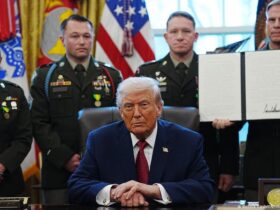Israeli Prime Minister Benjamin Netanyahu’s Cabinet was expected to vote Thursday on a ceasefire deal with Hamas, while Palestinian physicians said Israeli forces carried out several deadly airstrikes in the Gaza Strip.
If the multi-phase ceasefire gets final approval, it will come into effect on Sunday after more than 15 months of war.
UN agencies said they are ready to increase humanitarian assistance in Gaza, where the UN says at least 1.9 million people out of a population of 2.3 million have been displaced and 92% of housing units destroyed.
Israeli President Isaac Herzog offered his strong support for the ceasefire after the agreement was announced on Wednesday.
He said, “As President of the State of Israel, I say in clear words: This is the right step.” “This is an important step. This is a necessary step. There is no greater moral, humanitarian, Jewish or Israeli obligation than to bring our sons and daughters back to us – whether recovering at home, or resting.
But one of the deal’s main opponents in the government, Finance Minister Bezalel Smotrich, called it “a bad and dangerous deal for the national security of the State of Israel.”
The first phase of the agreement includes a 42-day ceasefire, the release of 33 hostages from Gaza, the release of Palestinian prisoners from Israel, a phased Israeli military withdrawal from Gaza and increased aid flows to Palestinian civilians.
During the first phase, details of the second phase focused on permanently ending the conflict with the release of remaining hostages and full Israeli withdrawal will take place.
The final phase involves the reconstruction of Gaza with a new governance and security structure.
The war in Gaza began when Hamas surprisingly sent its fighters into Israel in October. 7, 2023, terrorist attack that killed more than 1,200 and kidnapped more than 250. Of those hostages, fewer than 100 are believed to be in Hamas custody and a third are believed to have died.
Gazan officials say more than 46,700 Palestinians – most of them children and women – have been killed in Israeli military operations.
In a statement, the Forum of Families of the Hostages and the Missing, which includes the families of 98 hostages, said Wednesday they welcomed “the agreement to bring our loved ones home with immense joy and relief.”
“However, we remain deeply concerned and concerned about the possibility that the agreement will not be fully implemented and the hostages will be left behind,” the statement added. “We urgently call for accelerated arrangements to complete all stages of the deal.”
A senior Biden administration official told reporters that two of the surviving American hostages – Keith Siegel and Sagui Dekel-Chen – would be among the first to be released. The official spoke to reporters on condition of anonymity, as is typical at such briefings.
“The fighting in Gaza will stop and the hostages will soon return to their families,” US President Joe Biden said as he announced the ceasefire deal at the White House on Wednesday.
Biden urged his successor, President-elect Donald Trump, to implement the agreement as he prepares to hand over power on January 20.
Trump said on his social media networks that he was “thrilled” and that his administration would build on the success of the agreement to expand the US-brokered Abraham Accords to normalize Arab-Israeli relations.
He wrote, “This EPIC ceasefire agreement could only have resulted from our historic victory in November, because it signaled to the entire world that my Administration will seek peace and negotiate a deal to ensure the security of all Americans and our allies.” Will do.” Truth on Social.
Analysts say Trump’s fiery threats last week — that unless a deal is reached before his inauguration, “everything will be ruined” — may have played a role.
“President-elect Trump has been very clear, saying he will wreak havoc on Hamas if the hostages are not released,” said Mirette Mabrouk, a senior fellow at the Middle East Institute. “I mean, really, there is no worse hell than this that you could impose on the current residents of Gaza. They are already in hell, but there is also a feeling that they may have put some pressure on them [Israeli] Prime Minister [Benjamin] Netanyahu too. And that’s why we’re moving forward now.”
What about the next day?
Given the adage “the day after tomorrow,” some analysts expressed skepticism that the next administration could reach the larger goal, the US’s longtime vocal support for a two-state solution.
“I don’t see it coming under the Trump administration and that’s not entirely a criticism of the Trump administration or anyone else,” said Jonathan Ruhe, director of foreign policy at the Jewish National Security Institute of America. “I think both the Israelis and Palestinians are a long way from making the difficult compromises needed to achieve a two-state solution – I don’t think there is any political will on either the Israeli or Palestinian side.”
But as Biden and Qatar’s prime minister said in explaining the newly signed agreements, the deal is quite complex.
Biden also emphasized on Wednesday how difficult the negotiations have been, and he used that point to underline his administration’s strong support for Israel, which has stoked tensions between the US and its closest allies Is.
The President said, “This is one of the most difficult negotiations I have ever experienced.” “And it got to this point because of the pressure that Israel put on Hamas, supported by the United States.”
Some information for this story was provided by the Associated Press, Agence France-Presse and Reuters.








Leave a Reply